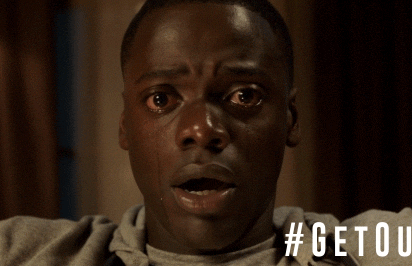The month of September has drawn to a close, but fret not readers because the autumn season isn’t over yet. It’s just getting started, but it’s wearing a new face: spooky season. To kick off October, it is only right that we fill up our watchlist with horror and gory goodness. But sometimes your typical horror film just doesn’t do it for you anymore. Jump scares and mirror reflections get predictable and frankly, it’s boring. It may seem like Horror is losing its luster, or is it?
In recent years, a new genre of horror has taken center stage in theaters: the social thriller. A social thriller is described as “a film genre using elements of suspense and horror to augment instances of oppression in society”, according to “Google Arts and Culture”. The genre highlights the issues of our society and the division we see in our world today. Jordan Peele uses current events and social commentary and molds them into a terrifying cinematic experience.
Peele’s directorial debut, “Get Out” (2017), tells the story of Chris (Daniel Kaluyya) and his girlfriend, Rose (Allison Williams), on a weekend getaway to meet Rose’s parents, the Armitages. In short, the weekend takes an eerie turn and leads Chris to discover the disturbing truth about Rose’s family.
The film tackles today’s political climate concerning race in such a brilliant way. Peele uses the Armitages to depict liberal racism and performative activism in America. These ideas are very prominent in a scene where the Armitages are hosting an auction for Chris’s body but are masquerading the event as an afternoon luncheon.
After “Get Out”, Peele yet again knocks it out of the park with his second release: “Us (2019)”. The film is about Adelaide Wilson (Lupita Nyong’o) returning to her childhood home in Santa Cruz with her husband and her two children (Winston Duke, Shahadi Wright Joseph, and Evan Alex). On the trip, Adelaide is haunted by a traumatic event that happened to her as a child in her hometown and her worst fears come true.
In the movie, Peele takes on the duality of America and of the “self”. The idea of privilege plays a central role in the film. Peele cleverly executes this theme by utilizing his longtime fear of doppelgängers or “tethereds”. The “tethereds” represent the idea that one has to suffer in order for another to prosper.
Maybe The Scary Monsters Are Us
“The scariest monster in the world is human beings and what we are capable of, especially when we get together.”, Peele said in a Business Insider article. Peele reimagines and reinvents horror films in a way that stirs important conversations we should be having about race and privilege. The social thriller redefines where the true horrors lie. It’s not a haunted house or malevolent spirits, but society itself.
Let us know your favorite horror movies by tagging us @HerCampusSJSU!


